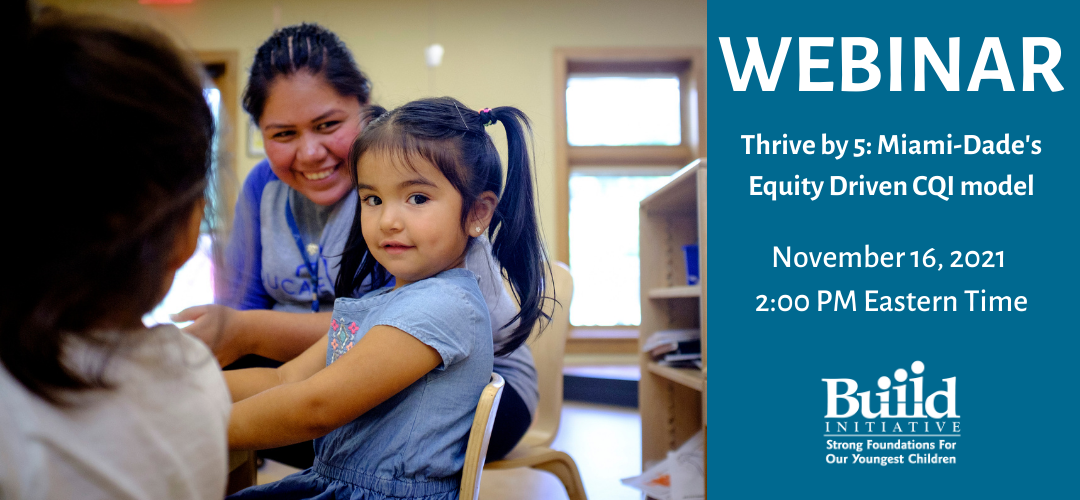Thrive by 5: Miami-Dade’s Equity Driven CQI Model
November 16 2021
2:00 PM EDT
 Miami was among the first communities in the nation to implement an early learning quality improvement system that started as an effort to prepare children for kindergarten, focused on developing basic skills in literacy, math and science, as well as social and emotional health and behavior. The Children’s Trust, using intensive review of data and multiple evaluations found that programs needed financial assistance to afford the high cost of quality care. Low school-readiness payments, under enrollment due to an oversaturated child care market, and limited high quality options acted as major barriers in increasing the quality of care. Miami’s new early learning quality improvement system, Thrive by Five, aims to overcome these barriers and level the playing field in low-income neighborhoods by providing strategic financial investments to incentivize programs to improve and sustain their delivery of high-quality early learning services.
Miami was among the first communities in the nation to implement an early learning quality improvement system that started as an effort to prepare children for kindergarten, focused on developing basic skills in literacy, math and science, as well as social and emotional health and behavior. The Children’s Trust, using intensive review of data and multiple evaluations found that programs needed financial assistance to afford the high cost of quality care. Low school-readiness payments, under enrollment due to an oversaturated child care market, and limited high quality options acted as major barriers in increasing the quality of care. Miami’s new early learning quality improvement system, Thrive by Five, aims to overcome these barriers and level the playing field in low-income neighborhoods by providing strategic financial investments to incentivize programs to improve and sustain their delivery of high-quality early learning services.
Join us to learn how The Children’s Trust analyzed QRIS data to target supports to address inequities in service delivery. Hear about how they refined their quality improvement system to respond to community child care needs that included families up to 300 FPL. Join us to hear Dr. Knopf share statewide data that illustrates that this quality improvement system corrected the market failure that led to unique resiliency in the pandemic, unlike any other area of the state. Engage with us in creative problem solving and solution mapping.
Presenters
- Trish Barnett, The Children’s Trust
- Herman Knopf, Ph.D., University of Florida’s Anita Zucker Center for Excellence in Early Childhood Studies
- Rachel Spector and Jennifer Ulysse, The Children’s Trust
Moderator
Jennifer Park, Ph.D., consultant to the BUILD Initiative
Explore More
Collaborative Leadership and Power Lessons on Authentic Family and Community Partnerships
Video June 20, 2024
During this one-hour webinar, hosted in partnership with Vital Village Networks, you’ll witness the limitless wisdom and leadership that lives in our communities. Hear about best practices and lessons learned from prenatal-to-three (PN3) coalitions across the country that are working to shift and share power with parents and community partners. We’ll explore what it looks like to build trust and relationships while redesigning what it means to lead together for the health and wellbeing of our children.

Family Engagement
Report June 13, 2024
Family engagement at the state and local level is an essential component of high-quality, inclusive early childhood care and education (ECCE) programs and systems. Engaging families as partners during the early years allows parents and caregivers to establish strong connections that support their children’s development, well-being, and achievement long term.
Ideas for Incorporating Strategic Financing Efforts into Your PDG B5 Application
Report June 13, 2024
This resource outlines ideas for incorporating strategic financing efforts into your PDG B-5 application.
